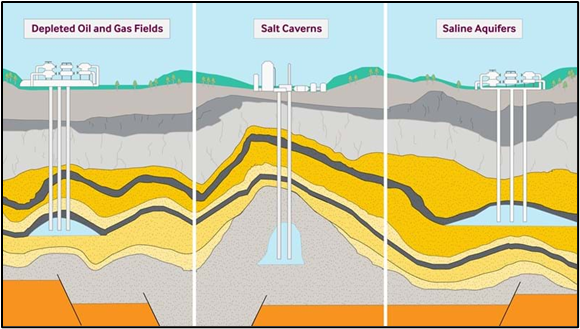Mains Daily Question
July 19, 2023
The Government of India considers natural gas a key transition fuel and is pushing to increase its consumption in the country. In light of this statement, highlight the potential benefits and challenges associated with developing and maintaining a strategic gas stockpile in India.
Approach:
Introduction: Introduce the topic of natural gas as a key transition fuel in India and explain the government's goal of increasing natural gas consumption in the country. State the purpose of developing a strategic gas stockpile (SGS).
Body: Mention the benefits of an SGS and the challenges associated with developing and maintaining an SGS in India.
Conclusion: Provide recommendations for the government on whether or not to develop a stockpile.
Answer:
Natural gas is a cleaner-burning fuel than coal or oil, and it produces lower emissions of greenhouse gases, so it is seen as a key transition fuel that can help countries reduce their reliance on fossil fuels and transition to a cleaner energy future. In India, the government has set a target of increasing the share of natural gas in the country's energy mix to 15% by 2030 and is considering developing a strategic gas stockpile (SGS).
An SGS would be a reserve of natural gas that could be used to meet the country's demand in the event of a supply disruption. This would help to ensure that India has a consistent supply of natural gas and that a supply crisis does not disrupt the nation's economy.
Natural gas can be stockpiled in a variety of places, including Depleted oil and gas fields, Salt caverns and Saline aquifers
The benefits of an SGS for India:
- Provide a buffer against supply disruptions brought on by natural disasters, political unrest, or armed conflict if it had an SGS. This would help to ensure that the country has a reliable supply of natural gas, even in the event of a crisis.
- Help stabilise prices through supply-side economics: When demand for natural gas is high - government can release gas from the stockpile to help meet demand. When demand is low - the government can store gas in the stockpile to help prevent prices from falling too low.
- Increase energy security - to meet its energy needs reliably and affordably - even in the event of a supply disruption or a price shock.
- Create jobs in the gas industry: This would include jobs in construction, operation, and maintenance, which would also help boost the Indian economy.
- Support sustainable development: Natural gas is a cleaner-burning fuel than coal or oil, and it can help reduce India's reliance on fossil fuels.
- Serve as a hedge against extreme price volatility in the international market as the price of natural gas can be volatile and is subject to several factors, including supply and demand, global economic conditions, and political events.
The development of an SGS in India is a complex and challenging undertaking due to the following reasons:
- High cost of construction and maintenance. The government of India has estimated that a 5-million-metric-tonne (MMT) stockpile would cost around US$2 billion, and the government would need to find a way to finance it without putting a strain on the national budget.
- Potential environmental impact. Natural gas is a cleaner-burning fuel than coal or oil, but it still produces greenhouse gases, so there is a need to ensure that the stockpile is designed and operated in a way that minimises its environmental impact.
- Security risks. An SGS would be a valuable target for terrorists or other criminals. The government of India would need to develop a comprehensive security plan to protect the stockpile from attack.
- Difficulty in forecasting demand. The demand for natural gas in India is expected to grow in the coming years, so the government would need to develop a flexible stockpile that can be adjusted to meet changing demand. For example, the stockpile could be made up of a mix of different types of natural gas, such as LNG and pipeline gas.
- International regulations. The stockpile would need to be registered with the International Energy Agency, which would also need to approve the stockpile before it could be filled with natural gas.
Developing an SGS would be a wise investment for the government of India. This can help ensure India's energy security and stabilise prices. If India does not develop an SGS, it could be more vulnerable to supply disruptions and price volatility. Therefore, the challenges of developing an SGS have to be overcome with careful planning and execution.


